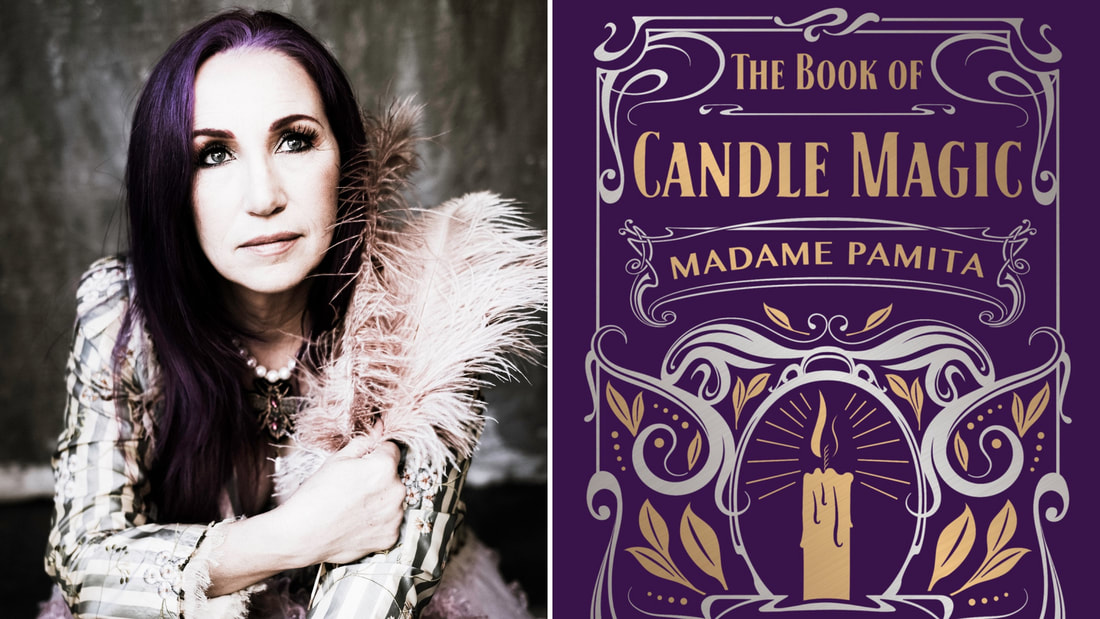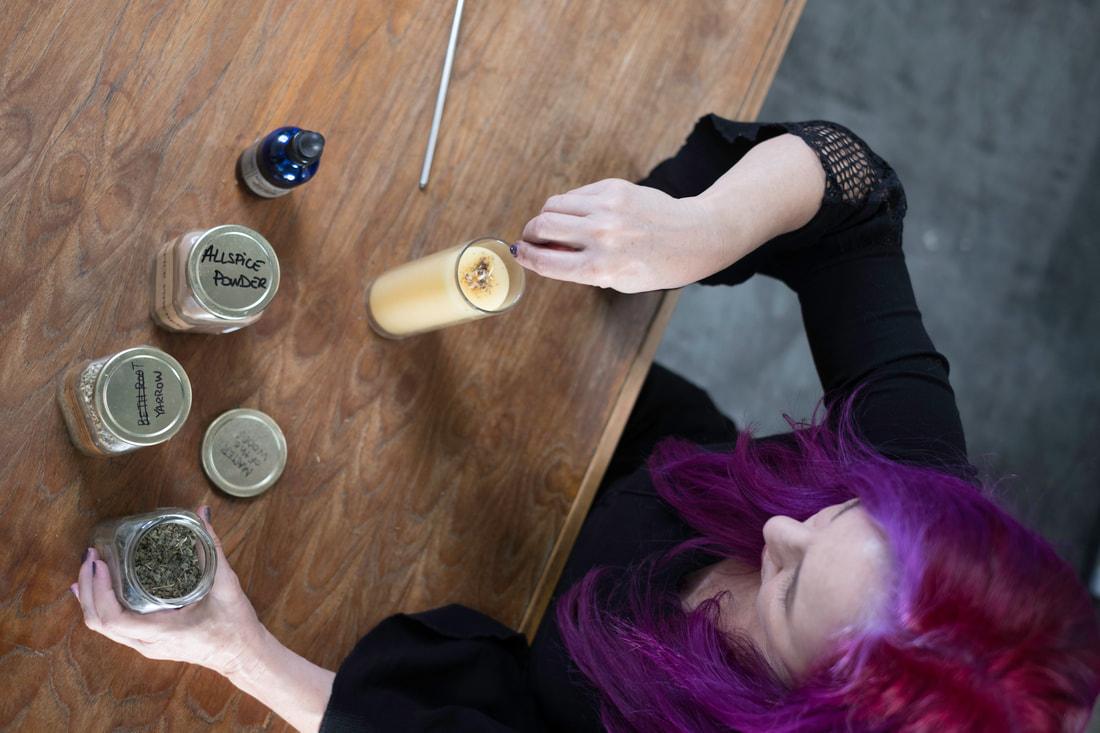|
By Amber C. Snider An interview with Madame Pamita, LA-based author of The Book of Candle Magic and owner of the online emporium Parlour of Wonders. Madame Pamita’s bestselling book, which has been flying off the shelves at Enchantments, has become a shop favorite since its publication in 2020. In The Book of Candle Magic, M. Pamita covers ways to enrich your life with spell work, including customizing your candle spells, layouts, rituals, timing, and more. Here, she does a deep dive into candle magic with editor Amber C. Snider and discusses ways to charge candles, focusing techniques, the power of symbolism, incantations, and the importance of clarity and confidence in spell work. Amber C. Snider: Let’s start with the basics of candle magic. How does one charge a candle? Madame Pamita: The first concept is that nothing has your inherent magic in it. For instance, hibiscus is a great herb for love magic and love potions, but on its own, it isn’t going to make someone fall in love with you or you fall in love with them. Your intention and your energy is what turns it into a potion. Same thing with a candle –– it isn’t necessarily a magical item [on its own], but it’s a fantastic ally and substrate for you to put in your magical intention. When you are working magic, you can hold a candle, close your eyes, and focus on your intention. What is your highest and best intention for your spell? What is it that you really want? Love? Prosperity? What would it look and feel like to have the prosperity you’re wanting? Do your spells with confidence. That’s the ‘magic ingredient’ –– the confidence and belief that you are going to obtain what it is you are visualizing. ACS: One of my favorite parts of your book is this quote: ‘The process of manifestation is actually not found in any candle herb or talisman. The power of magic is in the energy that begins within you. It starts with thought, extends through words and actions, combines with Spirit, and becomes manifest.’ What are your tips for clearing the mind and focusing our thoughts and intention? MP: The really key thing is to have belief or imitate that belief –– you know, fake it ‘til you make it. A great tool that comes to us from New Age circles is the idea of affirmations. They call it affirmations, but I call it spells or incantations. When you’re saying something over and over again you are rewiring your brain in some way and start to get on board with that topic. It could be anything: ‘I feel beautiful’ or ‘I look amazing’ even if you don’t feel like you look amazing. If you say that enough to yourself, overtime, you’ll start to get on board with that. If you want prosperity, say ‘I feel abundant’ even if you don’t feel that way. If you keep saying that, somehow it shifts things. I find that to be true across the board. ACS: I’m a big advocate for free writing and stream of consciousness exercises (and you also bring up the power of journaling in your book). In what ways can journaling help with our magical growth or spell work? MP: I see people with their fabulous looking Book of Shadows with beautiful calligraphy and I love that –– but it will never be me. I need to get it all out there and have a place where I can just do a [writing] dump and sift through that to find the nuggets. I think that happens in regular writing too: Your job is to write a really shitty first draft. When you give yourself that permission, it frees you and opens things up so you can find those nuggets [of what you’re really looking for]. We think everything has to be perfect, but [it doesn’t have to be that way]. For instance, you might think you need a new job, but when you start writing about it, you realize it’s just the boss who’s kind of a jerk. That brain dump will help you get to the bottom of your deepest, most foundational part of your magic so you can do it more effectively. In incantations, for example, people will rely on other people’s beautiful, poetic incantations. ‘As I watched the moon rise in the sky, I asked for my blessings to come from on high.’ They think it’s an incantation (which it is), but it’s just as powerful to say it in your own words. ‘Blessings come to me now’ –– any command or statement that’s made with confidence –– is just as powerful. ACS: You cover many different types of candles in the book –– taper candles, pull-out candles, figure candles –– it’s pretty comprehensive. What are your favorite candles to work with? MP: Yes, the book isn’t a recipe or spell book (there are so many books out there on that). But I created it like a lego: you take the pieces that work for you. You don’t have to have 10 different timings coordinated or every single herb, but you can bring in selections of those things to support your intention. If you’re doing a spell for good luck and want to bring in [different elements to support that spell], you say, ‘Okay I’m going to use a yellow candle (color magic). I’m to do it on a Wednesday (because Wednesday is about luck and chance) and I’m going to light it on the waxing moon phase because [the moon is going to increase] and I want to increase my luck.’ ACS: You also cover symbolism in the book. What are ways we can customize our magic through symbols and sigils? MP: Symbolism is also [powerful]. I’m a pretty visual person and there’s something about an image candle or figural candle that reinforces the idea of that intention. Symbolism adds a richness to your spell and reminds you of your intention in a beautiful way. Pyramids, for example, symbolize something strong, long lasting, and increasing –– getting to the pinnacle of what you want. Working with taper candles [are especially great] for people who can’t be that “out” with their family or need to do magic in a very secret way. At Enchantments, you all do the custom candles with symbols, colors, glitter...there are all those beautiful elements. So whether a symbol is carved into the side of pull-out candle or it’s a molded candle, you’re working with that beautiful symbolism and I love that so much. ACS: You write in the book, ‘Like a good contract, a petition paper should be focused and precise. Because you are working on a manifestation you should keep your petition paper positive.’ What are petition papers and what are some ways people can use them? MP: A petition paper is a written incantation. Petition papers were always really familiar to me because I was raised Catholic and we would make a petition to the deity or the saint to help us with some dilemma in our lives. [It’s a request for something]. Who you’re asking could be anything: the universe, a deity, your ancestors, your spirits, the force, or whoever. I clarify when I write. When I think of something, I think of all the different variations, nuances, and I can get lost going down rabbit holes, but when I write a petition it forces me to focus. Writing that long ‘brain dump’ and picking the really succinct, positive idea of what it is I want is quite powerful. ACS: How long should they be? MP: Some people say 'Oh that petition paper isn’t big enough for my petition.’ And I say, ‘You may have that list of 20 things that you want out of this spell, but you need to distill it into one idea.’ If you write I manifest my perfect job or I attract the perfect job it means all the 20 things you have in your head. I like those really succinct petition papers –– one really positive, confident statement. ACS: What are word power boosters in spellwork? MP: Power boosters are as much for your mindset as for your petition. They’re things that will shift your mindset about [your spell]. One of those is ‘Perfect outcome and perfect timing.’ The subtext is, ‘I’m willing to wait for the perfect thing. I’m not going to fuss about getting that thing this red hot minute.’ For experienced witches, you know you don’t always manifest everything immediately. The idea that you’re willing to put something out there, trust in the universe, and let it marinate is the ease that you give it so you’re not going ‘Are we there yet? Are we there yet?’ or worse saying –– ‘Oh my spell didn’t work’ –– which actually negates the work that you did. That’s why the word power booster of 'Perfect outcome, perfect timing’ leaves it in the Universes’ hands or Spirits’ hands. ACS: What’s another word booster to help with spell work? MP: I really love An open door is as good as a closed door. If you’re trying to attain your highest and best, you [may think it’s one thing], but if you’re co-creating with the energies of the universe or your deity, your spirits know more than you do about the situation. There’s something you’re good at, which is material world action, and there’s something they’re good at with their omniscients about the situation and knowing all the moving pieces. When we come to, let’s say the job situation again, we can look at the job from the outside, but we don’t know what our boss and coworkers are going to be like, what the work environment is like. Those things aren’t going to be listed in a job listing. Same thing in a relationship. So if it doesn’t happen with that job or relationship, take a step back and think ‘Great. I’m going to try another door then!’ That concept in your mind will prevent you from weeping over lost opportunities with that one thing or job or person and staying stuck there. Yes, you’re allowed to grieve it ––there’s no judgement about crying or being sad about something –– but to remain stuck in that sadness is a diminished way of looking at it. ACS: I love the idea that an open door is just as powerful as a closed one. It’s really so true! MP: Yes, a closed door prevents you from wasting your time on something that’s mediocre. And that’s the attitude that will help you: ‘Oh that wasn’t good enough for me.’ It’s not that you weren’t good enough for it. I think that’s a fantastic way for approaching things that aren’t working out when you want them to or when your magic isn’t working out the way you [think] you want it to. ACS: What are some ways people can use candle layouts to enhance their candle magic? MP: I love a simple candle, but I love the idea of complex workings when you really want to customize [your spell] and get creative. Candle layouts are [how you position] your free standing candles, like pillar, figural, or taper candles. Doing layouts is like bringing a little secret to the spell: you know what it is, but no one else does. I love the Crown Layout; Creating and laying out your candles in the shape of a crown for success, mastery, leadership, and confidence. It’s a beautiful way of working and I haven’t seen it before [in other magic books] –– it’s something I came up with. You could even accentuate [the layout] with herbs and crystals. It can be subtle, but it’s not subtle to you. ACS: A lot of people ask ‘What’s the most powerful spell?’ and of course we know there’s no such thing since magic has to do with your intention, manifestation, and will. Can you talk a little bit about what makes a spell powerful? MP: The most powerful spell is the one you have the most confidence about! There are spells that fall flat and there are some that take off, but if you’re super confident in your spell work, it’s going to come. If you’re doubtful, it’s kind of like rolling the dice a little bit. It really starts with you. An adept magician can create and manifest without any accessories, without a candle. But most of us, we take one step forward and one step backwards [by second guessing ourselves]. So that ability to be very focused and very confident, we can imbue that into our candle spell and let the candle do its work. The more confidence you bring, the more powerful your spell. ACS: The second most popular question is: ‘What’s the best time to do a spell?’ What are your thoughts on candle magic in regards to the lunar cycle or Wheel of the Year? MP: In terms of timing, there are so, so many ways to time our spells to support our work. It’s like having allies or an extra bit of help. You can do a spell for abundance during a waning moon (which isn’t a traditional time to do a spell for abundance), but you just know you’re going to have to add some extra ‘oomph’ to support it because the moon cycle isn’t supporting it. Timings can be: days of the week, time of the day, moon cycles, astrology, planetary hours. There are numerous ways, so find the ones that you groove with. You don’t have to do all of them, maybe one or two. ACS: What can the flame of the candle tell us? Once you’ve started to do lots of candle magic, the next step is to start to read candles. There are many ways: You can look at the flame or if it’s a glass-encased candle (like the beautiful ones you all sell), you can look and see if there’s smoke or soot on the side of the glass or read the incense or glitter markings like tea leaves; You can look at the flow of the wax, the strength of the flame, etc. There are two schools of thought with witches. Some people say ‘You need to set your candle and not touch it and see what it does.’ And I see the value in that, getting feedback is great, but it’s also called spell work for a reason. Technically when you’re doing spell work, you’re interfering with the fabric of the universe in some way. You’re imposing your will. So if things aren’t flowing the way you like [you can do something about it]. If I have a candle with a flame that’s weak or low, that may mean my intention wasn’t that strong, so I’ll pull a little wax off the wick to make it stronger and work with it. It’s controversial because some people say ‘You need to let it do what it’s going to do.’ But it’s the difference between being more proactive or more projective in your magic or being more divinatory in your magic. There’s a value in that divination, absolutely, but then why are you doing magic in the first place? Make it happen for yourself! You can purchase Madame Pamita’s The Book of Candle Magic at the Enchantments shop or online. For more on candle magic, click here to read our FAQs.
0 Comments
Leave a Reply. |
Archives
April 2024
MastheadPublisher Categories |




 RSS Feed
RSS Feed